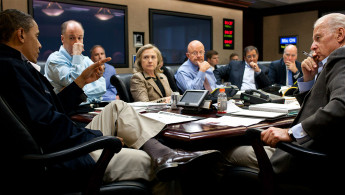More snooping in the pipeline with CIA shakeup plans
The CIA underwent several important changes, the latest of which was a comprehensive restructuring meant to better equip the agency to deal with future challenges.
Radical amendments
The first real change to the CIA in decades came in 2004, when then US President George W Bush introduced radical amendments to the work of Washington's intelligence agencies.
These minor amendments continued for a decade until the CIA felt it needed a new restructuring to combat future threats. These essentially related to cyberspace and the internet.
Al-Araby al-Jadeed has learned that in the past two years the CIA had obtained authorisation from the White House to expand its "defensive" responsibilities of combating the infiltration and hacking of US electronic networks, but also to conduct secret cyberattacks.
This included the infiltration of phone and other networks, both inside and outside the US.
Sources did not disclose the legal justifications the CIA uses for conducting such activities, but it is worth remembering that US laws prohibit the CIA from engaging in espionage against American citizens on US soil.
Recently, US media reported that the CIA had been working with security analysts to hack into Apple technology for years.
There were also reports that the CIA had been operating planes that fly from five US cities to spy on coversations via mobile phones on US territory.
The CIA's counter-terrorism centre was among the departments to witness the most radical changes under the Bush administration.
HR shakeup
The Talent Development Centre of Excellence and the Digital Innovation Centre are among the most important new directorates introduced to the agency.
Essentially, the agency wants to integrate all its functions into one single framework, increase coordination between its agents, and improve training and performance management.
The new changes, unlike those introduced by Bush in 2004, are the result of feedback and recommendations from CIA personnel, not from the White House or President Barack Obama.
| The new changes, unlike those introduced by Bush in 2004, are the result of feedback from CIA personnel |
Bush focused on bringing in more language specialists to the CIA, including linguistic experts in Arabic, Urdu, Persian, and Kurdish.
The new reforms focus on attracting more technological and digital talent into the agency, who can bring espionage into the digital age. It's a move that could essentially make traditional "spies" all but obsolete.
"The reforms will not be implemented immediately. Some need legislation from Congress, and others need approval from the National Security Council at the White House," said our source.
If, or when, these reforms are given the green light, it will implement the broadest and deepest reorganisation of US intelligence agencies in history, the source said.
The CIA is understood to have a centre specialising in the collection and analysis of information from open sources, often relying on what the foreign press, including the Arab press, publishes.
There is said to be a branch in the Jordanian capital, Amman, which focuses on analysing data from Arab newspapers and social media.
Listening in
Sources predict that the new reforms would merge the open source information centre, including the branch in Amman, with a special missions and units centre.
This body would be responsible for collecting and analysing information from social media and other open sources.
It would also carry out electronic espionage on suspect websites and hack mobile phone networks and devices belonging to targeted individuals.
In the past, any amendments to the CIA structure were required to pass the National Security Act, to facilitate partnership and information sharing among 16 intelligence agencies in the US.
A director of national intelligence post was also created, to oversee all agencies and liaise with the president and other government departments.
Intelligence gathering, if it wasn't before, appears to be becoming the number one priority in the corridors of the White House.
This article is an edited translation from our Arabic edition.



